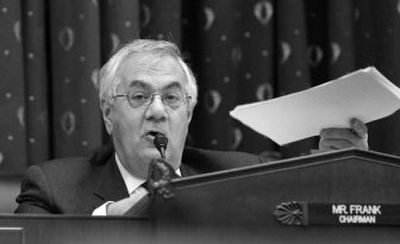Gay-rights bills have a chance

NEW YORK – Anti-gay bias has flared up in Hollywood and pro basketball recently, and soon the topic will be thrust dramatically into a new forum – a reshaped Congress likely to pass the first major federal gay-rights bills.
Wary conservative leaders, as well as gay-rights advocates, share a belief that at least two measures will win approval this year: a hate-crimes bill that would cover offenses motivated by anti-gay bias, and a measure that would outlaw workplace discrimination based on sexual orientation.
Also on the table – although with more doubtful prospects – will be a measure to be introduced Wednesday seeking repeal of the “don’t ask, don’t tell” policy that bans openly gay and lesbian Americans from serving in the military.
All three measures surfaced in previous sessions of Congress, at times winning significant bipartisan backing but always falling short of final passage. This year, with Democrats now in control and many Republicans likely to join in support, the hate-crimes and workplace bills are widely expected to prevail.
“With liberals in control, there’s a good possibility they’ll both pass,” said Matt Barber, a policy director with the conservative group Concerned Women for America. “They’re both dangerous to freedom of conscience, to religious liberties, to free speech.”
If approved by Congress, the bills would head to the White House. Activists on both the left and right are unsure whether President Bush would sign or veto them.
For gay-rights leaders – whose efforts to legalize same-sex marriage have been rebuffed by many states – the congressional votes are keenly anticipated after years of lobbying.
“This is a major step in our struggle,” said Joe Solmonese, president of the Human Rights Campaign. “I know there’s a lot of despair on the other side.”
The workplace bill – titled the Employment Non-Discrimination Act – is the subject of behind-the-scenes negotiations. The bill that emerges is expected to expand on earlier versions to cover not only sexual orientation but also gender identity, thus extending protections to transgender employees. Churches and small businesses would be exempt.
For many Americans, ENDA’s provisions would be familiar. More than 85 percent of the Fortune 500 companies include sexual orientation in their nondiscrimination policies, as do 17 states and many local governments.
And publicly, there is increasingly little tolerance for overt anti-gay bias. The National Basketball Association swiftly repudiated retired all-star Tim Hardaway after he spoke this month of hating gays, while TV actor Isaiah Washington apologized and sought counseling after using a gay slur in reference to a fellow actor on “Grey’s Anatomy.”
Advocacy groups also say there have been huge strides in regard to protections for transgender people – with nine states, scores of major corporations and more than 70 colleges and universities now banning discrimination based on gender identity.
In past years, some congressional supporters of gay rights warned that ENDA’s prospects would be crippled by including protections for gender identity. This year may be different.
Rep. Barney Frank, D-Mass., said the version he is helping draft will indeed cover transgender employees, while offering some allowances to employers so they can enforce dress codes and minimize controversies over bathroom use.
“With the proper amendments, I think we can get it,” said Frank, one of two openly gay members of Congress.
Tony Perkins, president of the conservative Family Research Council, contended that gay-rights groups exaggerated the extent of anti-gay bias as part of a broader push to achieve their political goals.
“I’m sure there’s probably a case here and there,” Perkins said.
“But I’ve seen more discrimination of people of religious faith than I’ve seen of gay people in the work force.”
ENDA was first introduced in the 1994 and came within one vote of Senate passage in 1996, while the hate-crimes bill has passed in the House and Senate in separate years only to falter before final passage at the behest of GOP conservatives.
The hate-crimes measure would expand existing federal provisions to include acts of violence against gays and lesbians. Opponents contend it would be an ominous first step toward criminalizing criticism of homosexuality.
“It’s taking us to the point where anyone who opposes the sexual behavior of homosexuals will be silenced,” Perkins said.
Assuming ENDA and the hate-crimes bill win approval, but not by veto-proof margins, Bush would face a politically sensitive decision of how to respond.
“Does he want to use one of his first vetoes to deny basic job protection to people?” asked Dave Noble, public policy director for the National Gay and Lesbian Task Force.
Mat Staver of the conservative legal group Liberty Counsel worried that Bush would not veto the bills, perhaps as a gesture of respect for Mary Cheney, the lesbian daughter of Vice President Cheney.